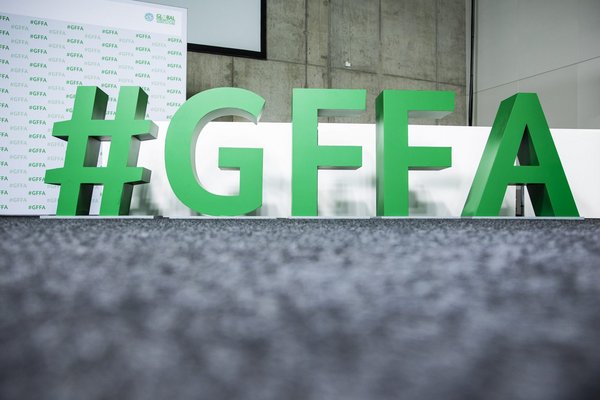- Share this article
- Subscribe to our newsletter
GFFA-2021 – a new reality, new business, and lessons to learn from global mega-crises
Covid-19 has turned the lives of humans across our planet topsy-turvy. Above all the first lockdown in spring 2020 and the closure of frontiers had a considerable impact on global agricultural production. Supply chains were interrupted, markets were no longer accessible, export produce went bad at the border checkpoints, and in particular in the rural areas of the Global South, people were once again threatened by hunger.
Thus, together with climate change, a further global challenge is now entering deep into the reality of people and businesses.
How can agribusiness respond to this challenging situation, and are there perhaps even opportunities for a resetting of business strategies which could promise success if we make proper use of lessons learnt?
Panellists on a panel of experts sought answers to these questions at the Global Forum for Food and Agriculture (GFFA), which was not held in Berlin/Germany this year but carried out online, from the 18th to the 22nd January. The panel of experts was organised by GFFA Berlin, reg. Ass., among the founders of which are the German Agricultural Society, reg. Ass. (DLG) and Deutsche Gesellschaft für Internationale Zusammenarbeit (GIZ) GmbH.
For many agribusinesses both in the Global South and the Global North, the world-wide closures of frontiers following the outbreak of the Covid-19 pandemic in spring 2020 came as a shock necessitating a speedy response and resetting of business strategies.
Professor Ortwin Renn, scientific director at the International Institute for Advanced Sustainability Studies in Potsdam/Germany, sees the world undergoing a multiple transformation process. First, triggered by the corona virus, a regionalisation or even nationalisation of markets is taking place, Renn maintains. Second, he says that a rethinking is in progress towards sustainability and ecology in order to respond to the consequences of global warming, and third, he also observes an increasing use of digitisation in the agricultural sector.
In order to address the complex challenges and find a viable balance between economic growth, sustainable agricultural production and conserving biodiversity as a means of protection against recurring bouts of pandemics, Renn proposes multidisciplinary round-tables which could develop sustainable scenarios for the future.
What should the response to disrupted supply chains be like? An example from Malawi
One of the greatest challenges world-wide was probably the collapse of supply chains in agricultural trade, which had occurred at all levels, internationally, regionally and locally. Ngabaghila Chatata, Managing Director of Thatntwe Farms, situated on the outskirts of Malawi’s capital Lilongwe, described her experiences on the GFFA panel of experts as follows.
Thatntwe Farm is one of the leading businesses in the horticulture sector. It also offers specialised services in business incubation, agro–processing, greenhouse manufacturing, capacity building in climate smart technologies. The restrictions imposed by African governments to contain the Covid-19 virus had destroyed the markets, and hotels and restaurants were among those no longer buying products, while the customers from the capital close by were also staying away. There was a lack of means of production, so that the business’s productivity was ebbing, Ms Chatata reported.
Flexible action was required, the manager said. Thatntwe Farm was switching to online and door-to-door sales, and was concentrating on local markets in the rural environs.
In the long run, Ms Chatata was considering focusing production on healthy and organically produced food in order to meet the demands of changing customer requirements; for in Malawi too, the notion of sustainability was increasingly gaining ground. This also meant making use of new technologies to enhance productivity. Thatntwe Farm was opting for environmentally friendly technologies such as water harvesting and applying compost in fertilising. Ms Chatata rejected using genetically modified plant varieties.
Call for a bio-Revolution
Mathias Berninger, Senior Vice President for Public Affairs, Science & Sustainability of Bayer AG advocated a bio-revolution. Covid-19 had caused the “one world one health and no hunger” strategy to falter, and the number of those going hungry had dramatically increased again over the past few months. “To achieve food security in times of pandemics and global warming, we need new varieties which are climate change-resilient and can survive rising temperatures, droughts and other natural disasters while rendering a further expansion of cropland through further deforestation unnecessary,” Berninger maintained. Here, genetic engineering offered a great potential for the future. Heat and drought resistant grain varieties were increasingly being cultivated in stress regions, and some of them demonstrated higher productivity as well.
On the panel, Berninger also demanded that access to modern cultivating technologies and sustainable production methods be ensured for smallholders in particular, for they were the backbone of agriculture in the countries of the Global South. Each year, Bayer was investing around two billion USD in breeding environmentally resilient varieties and the development of sustainable and environmentally friendly crop protection, Berninger stressed.
The presentations of the three panellists were followed by a lively online discussion.
Angelika Wilcke, editor, Rural 21, Frankfurt/Main, Germany


